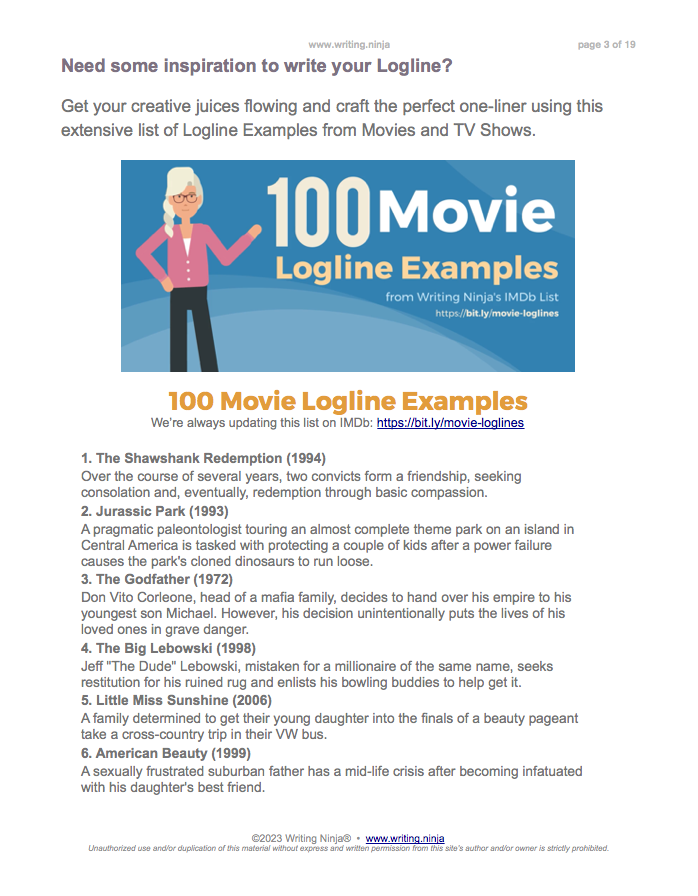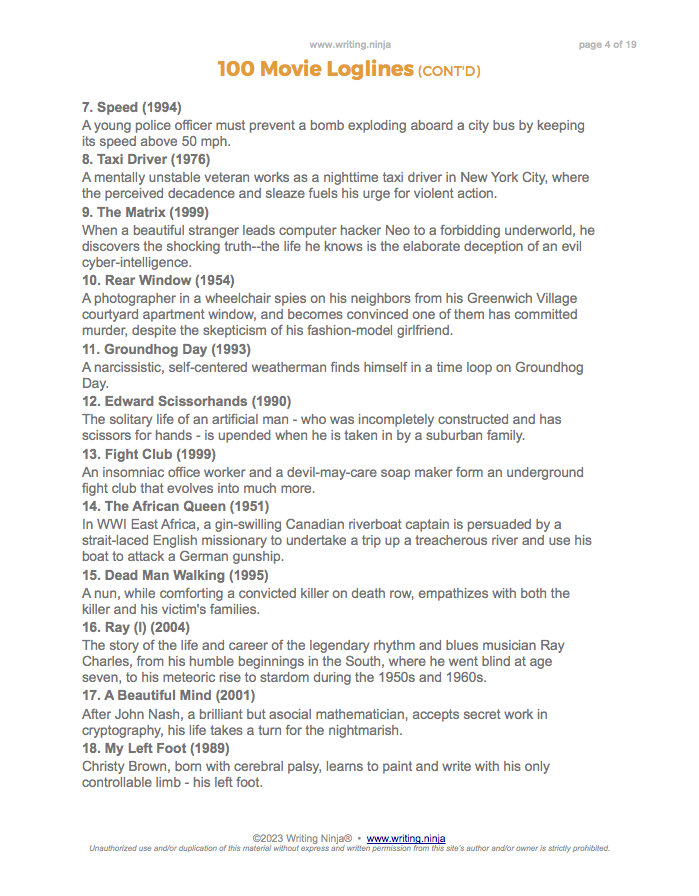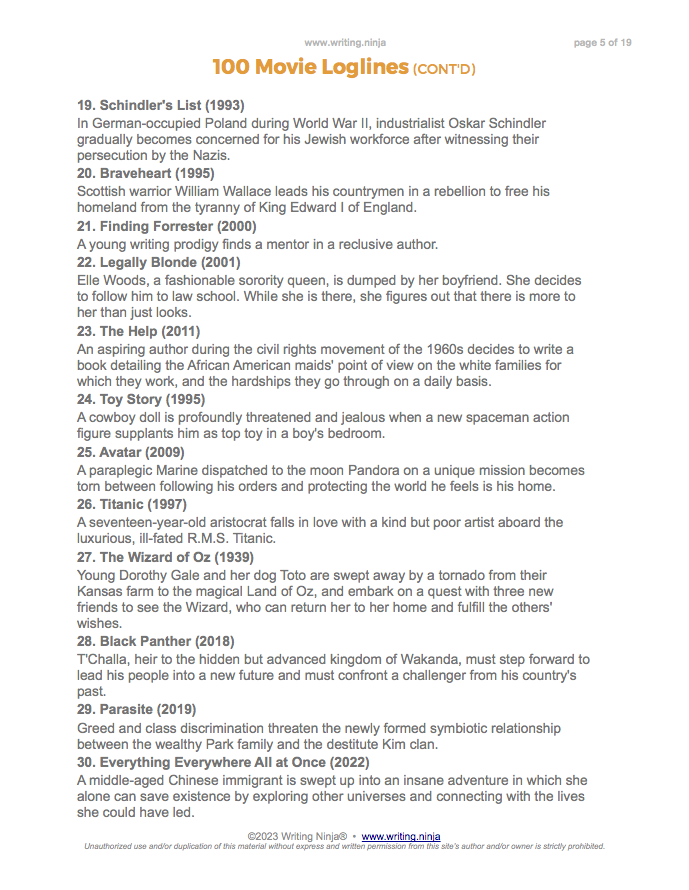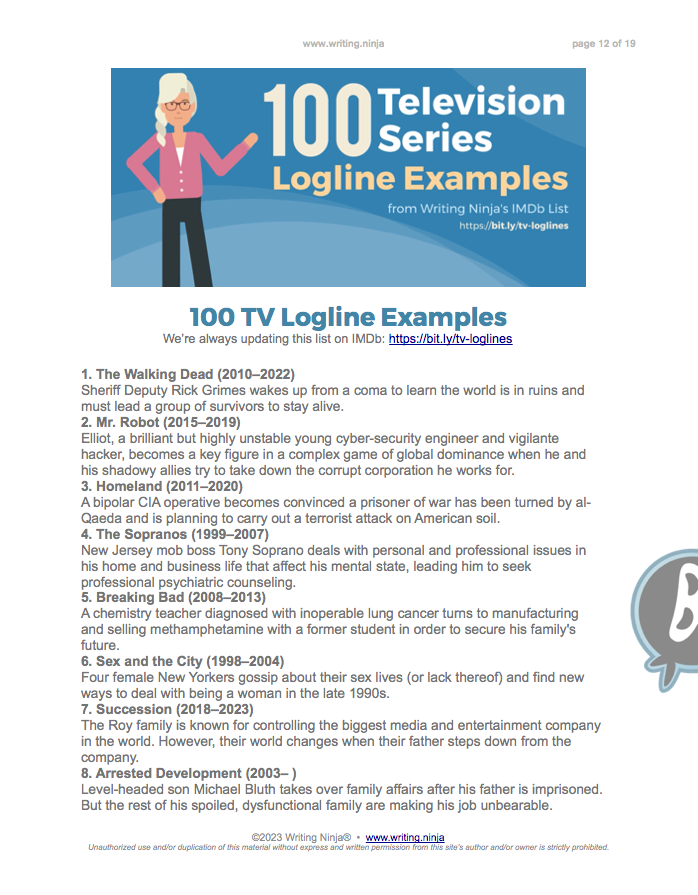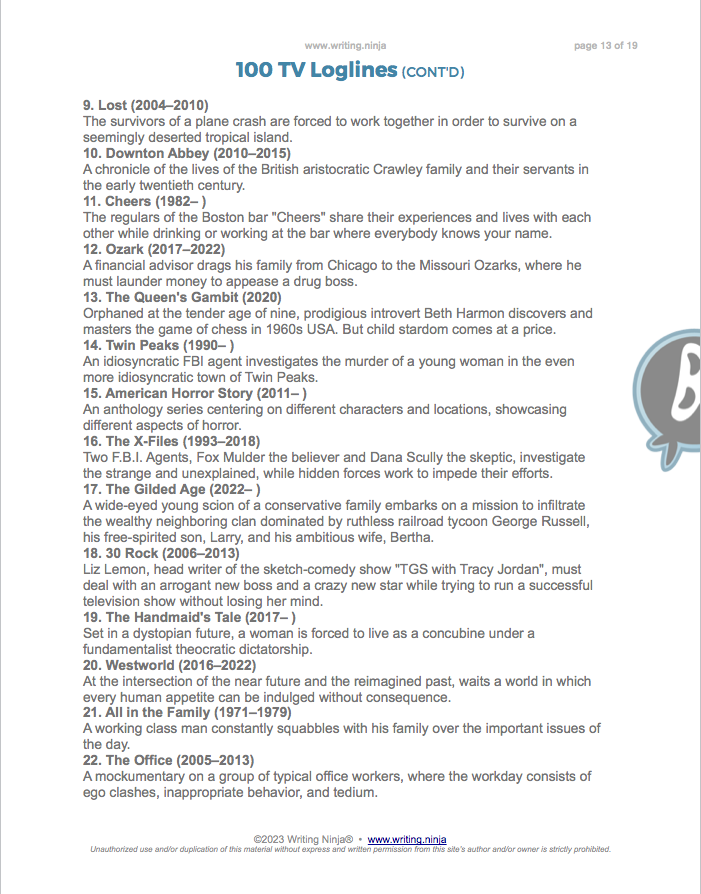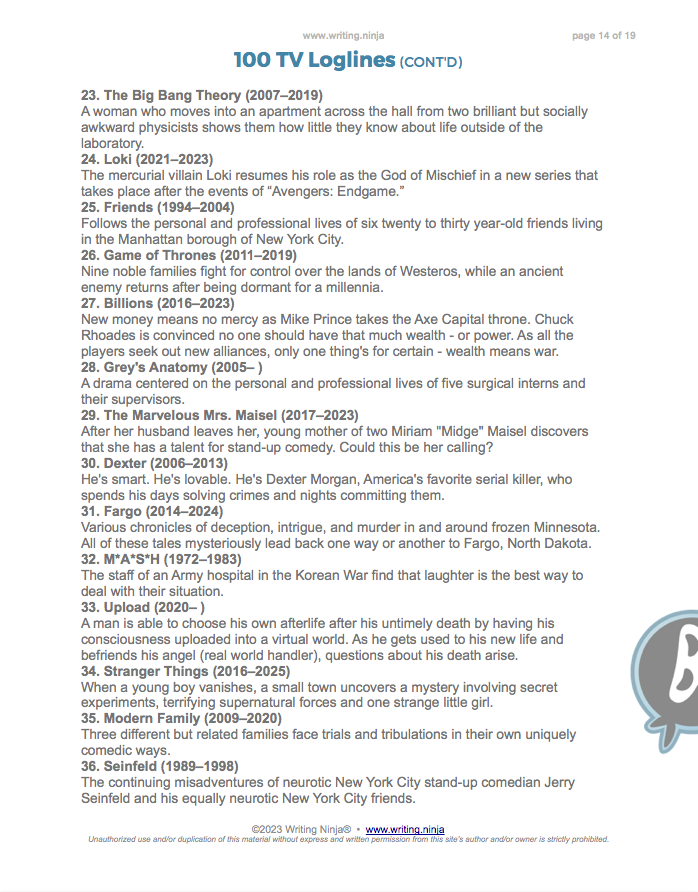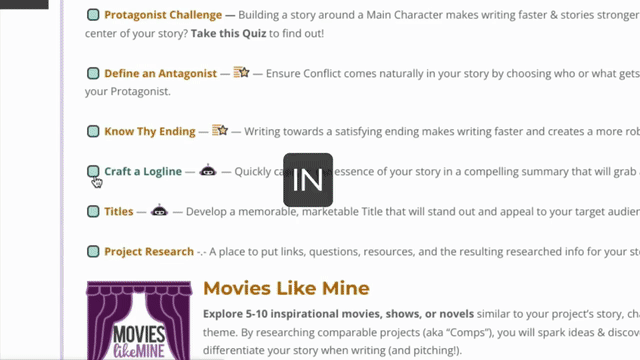The Ultimate Guide to Writing a Logline for Scripts & Novels
(with tons of Logline examples — and a fun Video Tutorial!)
Need some inspiration to write your Logline? Get your creative juices flowing with a step-by-step video on writing a Logline, a mega-list of Logline examples, and a Logline Generator!

Noi Sabal
Founder

13 min read • 3,436 words
If you want to learn how to write a Logline for your screenplay or novel, the best thing you can do is read Logline examples. Lots and lots of Logline examples! But not just any old Logline. You need to learn from really great Logline examples; ones that go beyond a typical “Logline formula” — while staying really, really close to the typical Logline formula!
Huh?! What does that mean? Hang on to your writer’s hat while we explain. 😉
In this article, we’ll dive into the often misunderstood craft of writing a Logline for your script or book. We’ll unpack the mystery of Logline meaning, get inspiration from a whole lotta great Logline examples for movies and TV shows, explore how to write a logline, and learn how to save time & get creative with a Logline Generator.
So… let’s jump into Loglines!

1. Logline Meaning
A Logline (or log line) is a short, catchy summary of your screenplay or novel that briefly describes your story. It’s the essence of your story distilled down into a compelling one or two-line statement. Great Loglines go beyond just summarizing your overall plot; they often evoke an emotional response designed to pique the interest of your potential readers, audience, or industry professionals.
Think of a Logline as your story’s elevator pitch, the hook that draws people in and makes them want to know more. A great Logline quickly makes people go, “Wow, I need to see/read this!!” It quickly hooks them — and leaves ’em drooling for more. You’ll use your Logline to pitch and sell your script or book verbally and get people hooked into wanting to hear or read more about it. (Check out our free Logline Examples PDF below for logline pitch examples.)
Loglines are also a super helpful tool for focusing your story before and during the writing process. The simple act of creating a Logline makes writing faster (because you have a basic idea of where you’re going right from the start). And your finished story will be that much stronger because you’ve created the most compelling version of your story.
2. When to Write a Logline
Loglines can be useful at many stages throughout the creative writing and marketing process. Before you write, Loglines can lend you clarity about your plot. During writing, it can keep you focused on what’s important in your story. And after you’re done, it can help you pitch and sell your story.
 BEFORE You Write
BEFORE You Write
Writers often struggle to craft a screenplay Logline because they try to tackle it AFTER they’ve written their screenplay. (It’s also true with Loglines for novels and short stories, but more so with writing script Loglines.) So they’re trying to fit in as much of the (wonderful!) detail and nuance of their story as they can shoehorn in. But when you only have 1-2 lines, it’s way easier to draft a Logline before you write — before all of the fabulous plot twists and character details start swimming around in your head, vying for precious space in those 1-2 lines. So, writing a rough Logline can keep you on track while writing, as well as help you pitch/sell your story. (And, if your story changes, you can always edit your Logline later.)
 WHILE You Write
WHILE You Write
As you progress on your writing adventure, you’ll learn more and more about your characters… what they’re doing… where they are… Fun!! But sometimes, if you’re unsure what your story is about or where you’re going, those characters will wander away… down unknown paths… and right into dead ends. Then you’re left with the dreaded Writer’s Block. But if you’ve already figured out who your story is about (your Protagonist) and mostly what they want (their Goal), and who or what is trying to stop them from getting it ( the Antagonist), then it’s far less likely that you’ll get stuck. So you’ll write faster and actually get to the end — because you know your Logline.
 AFTER You Write
AFTER You Write
Once you have a draft or finished screenplay or novel, your next job is to get people to read it, right? When people have 8-second attention spans, you don’t want to start wandering through your story’s characters, world, and what happens, trying to tell them the whole story. You don’t want to be caught unprepared! That’s why you need a quick way to get them interested. And a quick, tight Logline is just what you need to have in your back pocket, ready to pull out at any time and hook ’em!
3. VIDEO: Loglines Examples
Writing a good Logline doesn’t have to be hard!
This fun, five-minute video has everything you need to know about Logline writing: a brief Logline definition, some famous movie Logline examples, and breaks down the “formula” of Loglines, going deep into Logline structure and format — with a super in-depth breakdown of the Jaws Logline, going through all the elements and how it could be written. (Because the best way to learn about Logline structure is to use famous Logline examples!) So click play below to learn all about writing a good Logline:
Video Transcript (click to open)
Transcript for “Loglines Examples” Video
If you need to write a logline for your screenplay or novel, this video is for you!!
First, we’ll define Logline, take a look at some examples, and discover how you can write your own.
Did you know that the average person has an attention span of only 8 seconds? Less than a goldfish! That’s why you need a logline for the story you’re writing.
A logline is a quick one- or two-sentence summary of your book or movie. It’s what you use to hook someone; it’s basically your “Elevator Pitch” or your first impression. And did you know that having a rough logline helps you stay focused while writing a story? It’s like having a little roadmap that guides you through the writing process… helping you write better stories faster.
So let’s take a look at some Movie Loglines.
Here’s a Logline for the original Matrix. It packs a whole lot of important story elements into a deceptively simple line. It conveys Who the story’s about. What he’s doing. The movie’s premise. The story’s “vibe”. And it’s antagonist – all in a single sentence.
So now let’s break down what makes a Logline great.
There are 5 basic elements you should try to include in your Logline: A unique Character, which is your Protagonist. What’s at Stake for that character? What are their Specific Goals? Hint at the main Conflict. And finally, your Story’s Hook or Theme. Finding the right combination of these elements will help you write a Logline that shares the emotional core of your story.
Packing all of these elements into a logline might seem challenging. But there are two ways you can do it. You can write it yourself… or you can use your new Secret Weapon: Writing Ninja! In this fun new suite of Writing Tools, you just play around and answer a few questions about your story. And then, with just the click of a button, it gives you a bunch of Logline versions… each conveying the Essence of your story. Then you have tons of options you can choose from. It’s that easy!
Whoa… that was close!
So now let’s dive into How to Write a great Logline. First, you have to tell us who this story’s about.
So let’s introduce your Protagonist. Who is the hero of your story? Your Logline will often start with a description of your Main Character. It can be a character’s name; like “Chief Brody,” — but more often, it’s a brief description. So either a short 2-3 word phrase like: “headstrong police Chief”; or something longer like: “A police chief with a phobia for open water.”
Then you should hint at your Story’s Conflict. Your logline should also include the main conflict your Protagonist faces. What’s standing in your character’s way? What happens to make their life more difficult? Who or what is trying to stop them on their journey?
In Jaws, the conflict begins when a killer shark starts hunting on Amity beaches.
Next, what’s at Stake for your character? By the end of your story, what do they have to lose? What’s the worst possible thing that could happen to your main character? If there are no consequences, then you have no tension… and that means a boring logline! So what’s at Stake for Chief Brody? The lives of his family and the townspeople of Amity Island.
Next, share your Main Character’s Goals. Make sure your Main Character has a clear Goal. Why do they want it? Why do they want it? You want to allude to what drives your story forward in your Logline For Chief Brody, the Goal is to hunt down the shark. So he needs to gather a small team to track and kill it.
And finally; what makes your story unique? Try to convey your story’s Hook, Genre, Tone, or Theme. Using any of these elements will share the Vibe of your story. “We’re gonna need a bigger boat!” You have no story without a killer shark who terrorizes a seaside town; that’s the Hook. Jaws is a Monster story with a man-eater who causes chaos, which is the Tone of the story.
So let’s put all of these elements together in the logline for Jaws. “When a killer shark unleashes chaos on a beach community off Cape Cod, it’s up to a local sheriff, a marine biologist, and an old seafarer to hunt the beast down.” Pretty good.. Bt how ’bout we put it through Writing Ninja and get some other versions…! Oh, nice. There’s a lotta good ones here!
Let’s take a closer look at the second one and break it down.
We start with the Antagonist. Then there’s the Premise of the story; followed by the Protagonist and a couple of other characters that convey the story’s Vibe. And finally, the main Goal of the story; all in one evocative line. And did you notice there aren’t any specific Stakes included in this version? “hey…! Hang on… wait..! What about us?!” “Saving Brody’s family and the townspeople” isn’t specifically spelled out in this version of the Logline – but it’s implied. Which is okay; because there are no absolute Rules on how to convey the emotional core of your story. You have to kinda just… feel what works for you and your logline.
But remember, if you want to make logline writing easier, you can use Writing Ninja’s “Logline Generator.” It’s just one of over 50 Writer’s Tools we have in our story development platform. So if you wanna make it really easy to create professional quality stories, grab a free account and give Writing Ninja a try!
4. Movie Loglines vs. TV Loglines
Is there a difference between writing Loglines for features and television shows? Yep, sure is!
While Loglines for both movies and shows use The Five Essential Elements, they have a few key differences. We’ll dig into the specifics of how they differ in the Movie Logline and TV Logline sections below. But here’s a quick overview of the differences:
• Movie Loglines should be a tight, explosive, definitive summary of your project. They’re more about giving a quick overview of the specifics of your story.
• TV shows, on the other hand, are allowed a bit more room to paint a captivating picture of what’s to come for the characters in this world. They’re more about conveying the potential of your story.
The key difference between Movie Loglines and TV Loglines boils down to the level of detail and scope included in each type. Movies talk more definitively about what happens. TV shows allude to what could happen in the series.

5. Logline Examples: Movies
When it comes to Movie Loglines, you need to think big, bold, and punchy! Your Logline needs to grab attention faster than… a cheetah on Red Bull. Why? Because you have limited time to hook the person listening.
So, for Movie Loglines, you should focus on the basics of your project: your story’s core Conflict, the main character’s Goal, and what’s at Stake. (And it helps to sprinkle on some “Vibe Flavor” by highlighting the genre or any unique selling points.
We’ll get more into the theory or formulas for Loglines later. But honestly, the best way to learn how to write Loglines is to read lots of great Logline examples! If you read 100 amazing Loglines, you’ll start to see the patterns and it’ll be SO much faster and easier to write your own. Seriously!

— Stephen King
Studying good Logline examples can help you gain valuable insights into the structure, tone, and captivating elements that make a Logline compelling. It’s not terribly easy to sit down and whip up a concise Logline that captures the essence of a story! But luckily, when you analyze a bunch of successful movie Logline examples from IMDb, you enhance your own Logline writing skills. Let’s start with just a few:
Movie Logline Examples
The Shawshank Redemption — Two imprisoned men bond over a number of years, finding solace and eventual redemption through acts of common decency.
The Matrix — When a beautiful stranger leads computer hacker Neo to a forbidding underworld, he discovers the shocking truth–the life he knows is the elaborate deception of an evil cyber-intelligence.
The Princess Bride — While homesick in bed, a young boy’s grandfather reads him the story of a farmboy-turned-pirate who encounters numerous obstacles, enemies and allies in his quest to be reunited with his true love.
Jurassic Park — A pragmatic paleontologist touring an almost complete theme park on an island in Central America is tasked with protecting a couple of kids after a power failure causes the park’s cloned dinosaurs to run loose.
The Big Lebowski — Ultimate L.A. slacker Jeff “The Dude” Lebowski, mistaken for a millionaire of the same name, seeks restitution for a rug ruined by debt collectors, enlisting his bowling buddies for help while trying to find the millionaire’s missing wife.
As you can see, a good Logline not only lets you know what the screenplay is all about but can also tease, provoke, and hint at the Genre and Tone of your story, giving you a preview of what you can expect from this movie.
So, let’s dive into a whole bunch more examples! We made a list of “100 of the best Movie Logline Examples” on IMDb and then made a FREE downloadable PDF of Movie Logline Examples. Check ’em out by clicking on each page below. jump to TV
Remember to grab your free Logline Examples PDF!
This is just a 3-page sample of our 100 Excellent Movie Logline Examples list. If you’d like to see ’em all — for free!! — you can swipe the full Logline Examples PDF here.
Or, if you’d like to go directly to IMDb, you can browse our “Movie Logline Examples for Screenwriters” List here. We’re constantly updating it!
Logline Examples PDF
Want to download some Logline inspiration? Check out our free Logline Examples inspiration kit!
In this 19-page download, you’ll get 200 amazing Movie and TV Loglines, learn about the 5 Logline Elements, and get quick “How to Write Your Logline” Tips.
Use the blue “Logline Examples PDF” form below to grab this free swipe file!
Logline Inspiration Kit
FREE downloadable Logline Examples PDF
 In our free 19-page Logline Examples PDF, you’ll get a list of 200 exemplary Movie and TV Loglines, the 5 Logline Elements, and quick “How to Write” Tips. Get this free swipe file full of actionable ideas for tons of inspiration, and never miss another great article from Writing Ninja.
In our free 19-page Logline Examples PDF, you’ll get a list of 200 exemplary Movie and TV Loglines, the 5 Logline Elements, and quick “How to Write” Tips. Get this free swipe file full of actionable ideas for tons of inspiration, and never miss another great article from Writing Ninja.
Grab your free Logline Examples PDF by using this blue form:
Enter your email to grab your free Logline Examples PDF
6. Logline Examples TV

Writing a Logline for a TV Series is different from writing one for a Movie.
TV Loglines have a bit more room to breathe. Instead of cramming everything into one explosive sentence, you have a bit more wiggle room to explore things. You can provide a glimpse into the world of your show, introduce your most intriguing character, or tease ongoing storylines that’ll keep audiences coming back for more.
In Loglines for shows, you don’t have to give a finite overview of your whole movie. You can just tease the most important element of your show: juicy character arcs, unique set pieces, or exciting episodic adventures. And if you can show those producers/execs that your idea has legs — that your project has the potential for multiple seasons and can keep viewers hooked week after week — then your TV Logline is pure gold.
But just like with Movie Loglines, if you want to write TV Loglines, you need to read TV logline examples!
Let’s look at a few super-popular, well-written TV Show Loglines. You’ll notice that these TV Logline Examples often leave the reader with questions, enticing them to watch the show (or read the script) to find out what happens. Each of these TV Show Loglines also gives a sense of the show’s tone and genre, helping potential viewers understand the show’s vibe.
TV Logline Examples
Breaking Bad — A mild-mannered high school chemistry teacher turns an old RV into a meth lab on wheels in a desperate bid to secure his family’s financial future as he battles terminal lung cancer.
Stranger Things — When a young boy disappears, his mother, a police chief, and his friends must confront terrifying supernatural forces in order to get him back in a small Midwestern town in the 1980s.
The Sopranos — New Jersey mob boss Tony Soprano deals with personal and professional issues in his home and business life that affect his mental state, leading him to seek professional psychiatric counseling.
The Walking Dead — Sheriff Deputy Rick Grimes wakes up from a coma to learn the world is in ruins and must lead a group of survivors to stay alive.
Better Call Saul — Jimmy McGill is a small-time attorney hustling to make a name for himself and a forceful champion for his low-income clients.
House of Cards — A ruthless Congressman works with his equally conniving wife to exact revenge on the people who betrayed him.
Studying Loglines like these can help you start to see the patterns in the language. Once you start to feel the basic structure of Loglines, you’ll start to understand how you can share the essence of your story too.
As you may have guessed, we made a big fat list of 100 of the Best TV Logline Examples on IMDb (just like we did for movies!) The first few pages of TV Show Loglines from our IMDb list “TV Series Logline Examples for Screenwriters” are displayed below.
This was just the first few pages — there are a lot more! Want to see all 100 TV Logline Examples? Download the free Logline Examples PDF by using the Swipe File Download above.
Or, if you’d like to go directly to IMDb, you can browse our “TV Logline Examples for Screenwriters” List here. We update it sometimes. 😉
7. The 5 Logline Elements
Okay, so let’s review:
• Movies should have a tight, explosive Logline that conveys your story.
• TV shows gets a bit more room to paint a captivating picture of what’s to come.
But no matter which you’re writing, you need to consider the same basic story elements. Because writing a great Logline is more than just summarizing your story; it’s about capturing its heart and soul. While that might sound intimidating, it can actually be pretty easy when you consider that there are five essential elements to consider when crafting your Logline:
The 5 Logline Elements
- A Dynamic Character: Your Protagonist is the heart of your story. In your Logline, you need to succinctly convey who they are in a way that makes them stand out. Are they a disgraced cop, a rebellious teenager, or a ruthless lawyer? What makes this character unique and exciting?
- What’s at Stake: The Stakes are crucial in your Story — so they are crucial to your Logline. The higher the stakes, the more invested your audience will be. Your Logline should hint at what’s at stake for your Protagonist, whether it’s their life, love, job, or even the world’s fate.
- Conflict: Conflict is the engine that drives your story. It’s what stands in the way of your Protagonist achieving their Goal. This could be a person, an institution, a personal flaw, or a circumstance. Your Logline should hint at this conflict, creating intrigue and setting up the drama that will unfold.
- Goals: What does your Protagonist want? What are they striving for? Solve the murder case… win the love of their life… save the world… or conquer personal demons? The Goal should be clear in your Logline, giving the audience a glimpse of your character’s journey. (This is often linked to Stakes.)
- Story’s “Vibe”: Including the Hook, Genre, Tone, or Theme of your story will share not just what happens but what it all means (the underlying message or central concept). For instance, a Theme could be ‘Love is hard,’ ‘Power always corrupts,’ or ‘Happiness isn’t for everyone.’ Try subtly incorporating your story’s Vibe when crafting your Logline to make it come alive.
Jaws Logline EXAMPLE
“A police chief with a phobia of the ocean must overcome his fear and battle a gigantic shark terrorizing a small beach town.”
In this one sentence, we have all five of the essential Logline elements:
- A unique Character (a police chief with a phobia of the ocean).
- A clear Goal (he must overcome his fear and battle the shark).
- High Stakes (the safety of the town).
- An intense Conflict (the shark terrorizing the town).
- A hint at the Vibe (Theme: overcoming personal fears & Tone: “terror” and “battle”).
8. Logline Generator
Or you can make Logline writing a snap with a Logline Generator! Then you can skip figuring out how to pack the bazillion things above into that precious one- to two-sentence pitch. You can get a Logline Generator to do it all for you. (Yay!!)
A Logline Generator is a writer’s tool that helps screenwriters and novelists write their Loglines. Traditional (old school) Logline Generators kickstart your Logline writing by giving you prompts/ideas that get your creative juices flowing, but you still do all the hard work of writing the log line. But with a Story Logline Generator (sometimes known as an ” AI logline maker,” “logline creator,” or “log line generator”) or a Screenplay Logline AI Generator (also known as an “online film logline generator”or “film logline generator”), you can save tons of time and frustration because it actually writes the whole Logline for you. Like the one in Writing Ninja!
Writing Ninja’s one-of-a-kind AI Logline Generator makes Loglines a snap!
Neno.ai, Writing Ninja’s built in AI Writing Assistant, serves up lists of professional Loglines for your story — in seconds!!
After you answer a few questions about your project, Neno.ai can generate dozens of polished, IMDb-ready Loglines customized to your project. You can use any of these Loglines as they are — or Neno can help you combine, revise, and polish until you have the perfect Logline.
Neno.ai makes writing your Logline super fast, easy, and, dare we say it, fun! You can see it in action here:
Writing Ninja’s Logline Generator
Takeaways
Remember, creating a quick Logline BEFORE you start writing is a good idea for lots of reasons. So, it’s super important to know how to write a Logline.
Why? Because when you solidify The Five Essential Elements of your story before you write, you’re basically creating a little cheat sheet to use while you write.
Creating a rough Logline helps you discover:
— WHO your story’s about
— What they WANT
— What’s at Stake
— What creates CONFLICT
— What happens if they FAIL
And your Logline acts as a high-level roadmap. Knowing where you’re going makes you more likely to reach your destination. You won’t get lost on your trip and won’t write yourself into a corner or get blocked. (Writer’s Block — ew!)
A solid Logline gives your story maximum bang for your buck. Because once you have your fine-tuned Logline, you can pitch your story idea quickly and effectively to anyone who asks… family, friends, producers, actors, or investors. Yay!!
Writing Ninja’s Logline Generator makes it really easy to write amazing Loglines. And it’s just one of over 50 Writer’s Tools in our story development platform!
So, if you want to make it really easy to create professional quality stories, grab a free Writing Ninja account and give the best logline generator a try!

About the Author
Noi Sabal has been steeped in story for decades: writing screenplays, teaching storytelling at the university level, editing TV shows & feature films, and consulting on scripts. Her work has been broadcast nationally and worldwide on ABC, Disney, Fox, Nickelodeon, Sundance, and many more. In 2017, Noi founded Writing Ninja®, story development tools that make it easy for writers to develop professional-quality stories for their novels and screenplays.
All product and company names, logos, links, and brands are trademarks™ or registered® trademarks of their respective owners. Use of them does not imply any affiliation with or endorsement by them, and we do not endorse, warrant, or guarantee any of their products or services.
Recent Articles
The Ultimate Guide to Theme in Screenwriting
Ready to elevate your writing? Using Theme in screenwriting can be a game-changing secret weapon. Dive into...
Mastering the Art of Active Voice
Want a quick trick to make your stories more engaging? Write in an Active Voice! Read on to discover what "Active...
It’s Screenplay Season! Time to Download & Read the Best Scripts of the Year
Looking for scripts? We have the most comprehensive list of downloadable screenplay pdfs for the 2022 awards season....

Want to make writing Loglines easy? You can!
Writing Ninja has a fun, easy-to-use “Logline Generator” that makes writing Loglines FAST. (And it’s just one of over 50 Writer’s Tools in Writing Ninja!) Grab your free-forever account to see how easy it is to write professional-quality stories with our one-of-a-kind story development platform.

Writing Ninja is an online story development platform that makes it really easy for writers to create professional quality stories for screenplays and novels.
Membership
Features
Why Writing Ninja
Company
On the Ninja Blog
The Ultimate Guide to Theme in Screenwriting
Ready to elevate your writing? Using Theme in screenwriting can be a game-changing secret weapon. Dive into storytelling...
Mastering the Art of Active Voice
Want a quick trick to make your stories more engaging? Write in an Active Voice! Read on to discover what "Active Voice" is...


